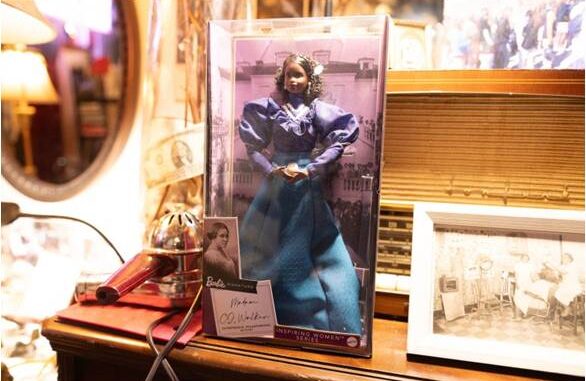

“This place is the pinnacle of Black excellence and the promotion of female empowerment,” said de Forest. “The whole foundation of our success as businessmen and women was built on Black women like Walker. I stand in complete gratitude to these women.”

A student of hair cair, de Forest’s career has seen his hair and makeup work in the pages of Essence, Shop Talk, and Professional Salon magazines. He also owned a popular salon in Atlanta before retiring. When he saw the shop he said he knew what he had to do next. He went to the barbershop next door and asked about who the owner might be. The Madam C.J. Walker Beauty Shoppe had seen better days and people said it would need a lot of interior work done in order to have a beauty salon up and running again. De Forest had other ideas.

“Immediately it was for personal reasons,” de Forest said when asked why he started renting the spade. “The highlight of my career was to work in an original Walker property.”
That work would become more collection and curation, and less combs and curls.
When you walk into the Madam C.J. Waker Museum you are transported into a Black space. The black-and-white photos of musical luminaries such as Aretha Franklin, Sam Cooke, Stevie Wonder, Tupac Shakur, Gladys Knight and the Pips, and Chaka Khan immediately command your visual attention. The photos are on the ceiling and the walls. Other photos of de Forest’s mother, mentors, and inspirations sit on tables stationed around the room. de Forest says he asks visitors if they can name 20 of the people in the more than 50 black-and-white photographs around the room. If they succeed he allows them to pick a vintage 45-inch record from a box.
There are walls of records -jazz, funk, soul, classical- aligning the walls of the museum as well. Though a large portion of the records are de Forest’s, there are many that belong to the late father of a friend, Chatel Mullen. The collection of vinyl belonged to Isaac Mullen and Chantel believed it would be best to donate the records to de Forest and the museum rather than to a record store, for example. When we arrived to interview de Forest that Tuesday afternoon, Sam Cooke’s 1960 classic “A Change Is Gonna Come” played over the loudspeakers, which also were donated to the museum.

“That’s how the community can help a museum, by donating,” de Forest said. “As a community, you have to pitch in. When I started preserving this place the community started to bring me stuff.”
To generate funding for the museum, which de Forest said he financed himself, there are Black books and vintage albums for sale, and of course, there are the tours. Visitors will get a look at some of the tools of the trade, including Madam C.J. Walker-branded products in their original containers and tins. Hot combs and curlers in the displays at the center of the room are also originals that de Forest found inside the shop. He cleaned them up and immediately put them for all to see.
“I had a very small budget, but I was hell-bent on preserving this place,” de Forest said. He recalled telling his wife about his plans to convert the former hair salon into a museum/gift shop and remembers her using a couple of four-letter words during her response to his asking what she thought.
de Forest also credits women such as Annie Turnbo Malone and Sarah Spencer Washington, a pair of Black beauty pioneers and successful businesswomen in their own right. Photos of both are on display inside the museum.
“This museum is important for me, but it is also humbling,” de Forest said. “I am completely guided and driven by artistic excellence. I just answered the message my ancestors sent me.” Local business owner Dwaine Go dropped by later that afternoon. A frequent visitor to the museum, Go said the first thing that comes to mind when he thinks of the museum is “home.”
“This museum is the preservation of the values that we have as a people,” he said.
de Forest added, “I’d like for the legacy and some of the fiber of Auburn Avenue to remain.”
As Stevie Wonder’s 1973 hit “Higher Ground” played in the background, de Forest added, “This place is a legacy, it’s larger than life.”
For old Atlanta and new Atlanta alike, the Madam C.J. Walker Museum can be seen as higher ground in a way.
The Madam C.J. Walker Museum is located at 54 Hilliard Street, N.E. is open Tuesday-Saturday, noon to 4 p.m., and on Sundays from noon to 3 p.m.
Article retrieved via link below:

Be the first to comment